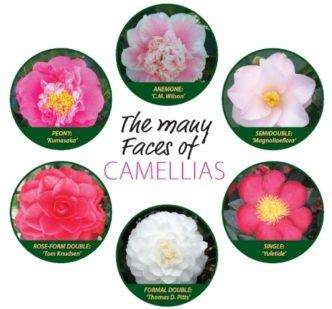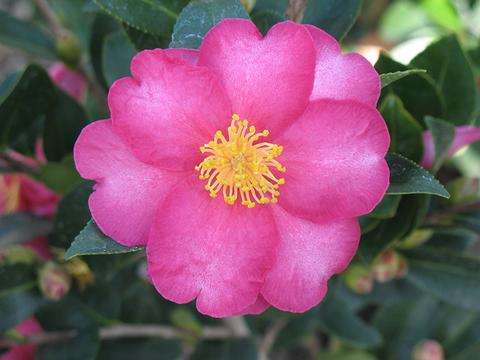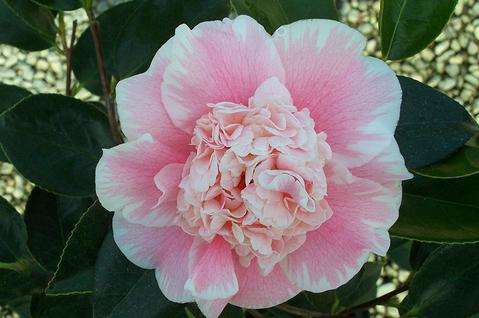
Colorful Camellias

When selecting blooming shrubs for your garden, don’t overlook the camellia, an evergreen with flowers that appear from winter to spring.
There are two species that are generally available: Camellia japonica and Camellia sasanqua. Both species are highly ornamental but differ in their hardiness, growth habits and flower types. Bloom season is one of the biggest differences between the two; sasanquas bloom in fall and early winter, and japonicas bloom late winter and spring.
There are two species that are generally available: Camellia japonica and Camellia sasanqua. Both species are highly ornamental but differ in their hardiness, growth habits and flower types. Bloom season is one of the biggest differences between the two; sasanquas bloom in fall and early winter, and japonicas bloom late winter and spring.

Camellia sasanqua
- Mature height ranges from 2-3′ up to 12 feet, depending on the variety
- Flowers are 2-4″ in diameter, with dark-green, shiny leaves about two inches long
- Flowers open in early winter and generally not fragrant
- Sensitive to long periods of subfreezing temperatures and do best in zones 7 through 9

Camellia japonica
- Mature height ranges from 6′-12′, although they can reach a height of 25′
- Flowers can be as large as 5″ wide; partially or fully-doubled
- Flowers open in late winter, although timing can vary by variety. Available in many colors including white, pink, rose, red and mixed red and pink; lightly fragrant.
- Japonicas and sasanquas are generally slow-growing, but japonicas are a bit slower than sasanquas
- A little more hardy than sasanqua and do well in zones 6 through 9
How To Care For Your Camellias
- Light: Both prefer partial sun for most of the day, but sasanquas can tolerate some full sun better than japonicas, provided they are well-watered
- Soil: They both need soil rich in organic matter; amend soil with compost at planting. They also prefer slightly acidic soil, with a pH of 5 or 6, and require regular moisture, especially before they are fully established. A 2-to-3-inch layer of organic mulch conserves soil moisture and helps cool the roots.
- When to Plant: Both species of camellia can be planted any time of year that the soil is workable, as long as they are well-watered after planting. Camellias are shallow-rooted plants and should be planted at the same depth they were in their nursery pots. Give each plant good soil for new roots by digging a wide hole (only as deep as the rootball) and partially filling the hole with loose soil before planting.
- Pruning: Although pruning either type of camellia isn’t necessary, you may cut back as needed to control size; just remember to prune after blooming.
